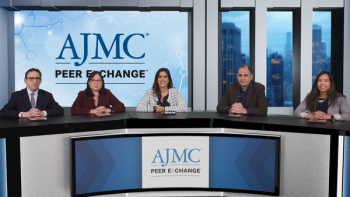
Comprehensive Genomic Profiling and Informed Decision-Making
How to determine what information from comprehensive genomic profiling assays is relevant vs extraneous when making treatment decisions for patients with solid tumor cancers.
Episodes in this series

Bruce Feinberg, DO: Mark, I want to go back to you, because I'm listening to Eugean [Jiwanmall, MPH, MBA,] and I'm thinking about, again I keep hitting with you with other disease states, but we went through a period of 5 to 7 years in which there was a movement to stop testing patients for PSA [prostate-specific antigen]. The argument was, in my mind, doctors and patients can't be [trusted] with the information because they will act irrationally. If that PSA is elevated, they will do tests and potentially even do therapeutic procedures, that weren't in the patient's best interest. Because you can't hear you have cancer and not respond in some way. Whereas, you could argue, that information is never a negative and having more information isn't necessarily bad, as long as you have the capacity to ingest the information and use it wisely.
Now, we've got the pendulum shifting back regarding PSA. I feel like we're having some of that with regard to as we again migrated from the naming of NGS, next-generation sequencing, into complete genomic profiling, that I'm hearing some of that argument. That, the problem is the clinicians and the patients can't be trusted with the information. They're going to start getting all these expensive treatments. They're going to get things that don't work. They're going to get things that maybe can harm them. Where's the evidence for all of that? Take me into your day-to-day practice and how you use it when you're seeing patients?
Mark G. Kris, MD: Lung cancer, I think many have said is the prototypical illness here. That, the truth is, a person with advanced lung cancer in 2021 needs to have their tumor interrogated for approximately a dozen mutations, gene fusions or/and also need some immunohistochemistry test. Those results are pretty much standard for every single patient. The gene tests are used for 2 things. Number one, if you find a match between a mutation or aberration of some fusion in one of genes for which there is a targeted therapy. I think the NCCN [National Comprehensive Cancer Network] today, I'll pick on them, they have 6 genes that they say, "We all agree that these are consensus targeted therapies."
The other important thing about that, and there's emerging information on this and you may have noticed this on television, it is "You have those genes, you don't get [immunotherapy.]” Did you notice that in the ads for the checkpoint inhibitors? This is for patients, and it’s crazy that our ALK, EGFR are negative, and during the time out on the football game, you hear this, but that’s what people do. That information is super critical in the negative way. I think Kenna and I, think both mentioned this before, that you need this to say, “Who’s not going to get an immune therapy."
The crazy thing with PD-L1, it's a immunohistochemistry stain on a tumor tissue, that it shows a likelihood of benefit from these immune agents, but it's nowhere near the prognostic value of the genetic test. But people use that to decide whether or not to give chemotherapy. The current state today is, at the time of diagnosis, you get your histologic diagnosis and then you would get a testing for the common genes, usually by an NGS panel of some kind. Then you get this PD-L1 testing and use that to decide on your therapy. That's for every patient.
Bruce Feinberg, DO: If that panel was a panel of 12, 20 or 30 [genes], would you prefer the panel that has 500? Because you're only going to do this once and there may be information within the other 470 genes that may have value later, that you don't know has value now. If there was no price difference between a panel of 20 vs 500 [genes], you'd rather have the 500? How does that work? Because there was a certain notion of the bigger, better as we were getting into, with Eugean's comments and that more and more and more, and that becomes the arms race. Which of the companies with commercial tests have the biggest panel?
Mark G. Kris, MD: People have struggled to look at patterns of mutations outside these known drivers or to look at co-mutations with these drivers. So far, it's not a fruitful exercise. Yes, you can tease out some bad or good prognostic categories. TP53, if I'm going to pick one gene, it's a tumor suppressor gene is probably the most commonly, is that true, mutated tumor suppressor gene in cancer? About half of patients have it, and it's not good. But we don't use it to choose any kind of therapy. But people focus in on the genes I told you about, the ones that are associated with a targeted therapy, and the PD-L1.
There's a few people and I'm- again, remember this, I'm a “mutationist,” I do use the TMB [tumor mutation burden], but it hasn't caught on, Kenna [R. Mills Shaw, PhD], with at least thoracic oncologists, it just hasn't. Most of them don't use it. But even though all those genes are there, you focus in on the ones that are relevant. When you look at the annotation of these panels, it focuses in on those genes. It does show genes for which there are clinical trials, but that's a secondary thing that you might see. But people don't look at all the genes. They look for the ones that are critical and the reports are such that those genes are highlighted. As I use the term level 1 or category 1, that's where you have a match of a FDA-approved therapy with a specific gene target. Those things are highlighted for the oncologist.
Transcript edited for clarity.
Newsletter
Stay ahead of policy, cost, and value—subscribe to AJMC for expert insights at the intersection of clinical care and health economics.









